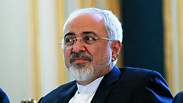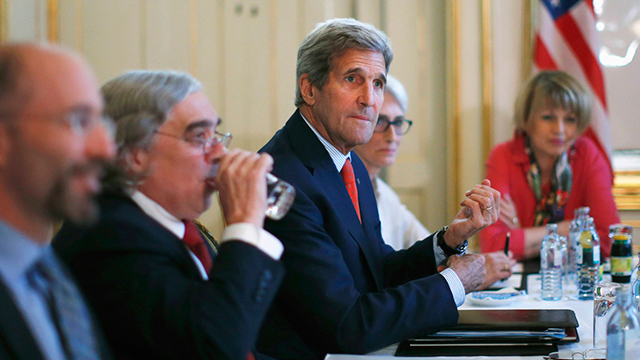
Marketing a bad nuclear agreement
Op-ed: We are about to receive an Iranian product, which changes the balance of power in the region, with bright and aggressive American marketing. Had this US administration ran the Cuba crisis in 1962, the world would be controlled by the Russians today.
All the rest – how will the supervision be carried out in the future, what will Iran expose about its dark past in the nuclear area, when will the sanctions be removed and under what conditions will they be restored – is a swampy mixture of legal terms which will swallow the White House's alleged achievements over time.
The Iranians, on their part, are continuing to abuse the Americans up to the very last moment. In the beginning of the week, they suddenly raised a new demand which had not been part of the negotiations. Iranian Foreign Minister Mohammad Zarif brought a nuisance into the room in the form of a demand to lift all the restrictions on the production of ballistic missiles, in violation of all the understandings related to the missile technology control regime (MTCR).
Until Monday, the permanent Security Council members and Germany's representatives were still trying to understand whether this is a real nuisance or one aimed at getting the West to give in a bit more. The Iranians are still applying pressure and will do it even five minutes after the end of the game and stoppage time – simply because they can.

On July 9, the American Congress goes on recess. Until July 8, the administration must present the detailed agreement to the Congress, with all its appendices. According to legislation, the Congress must review the document and ratify it within 30 days. If the document is submitted after July 9, the whole thing will be postponed by at least two months.
Obama administration officials have estimated, rightfully, that two months is too long and will allow the agreement's opponents in the House of Representatives to try to undermine it. On the other hand, if the agreement is presented now, the administration has a majority in the Congress which will approve it. That's why Israeli officials also believe the agreement will be signed as early as this week.
In this war, at the end of a holding-defense battle which lasted about 15 years, Israel lost. The defense establishment is already dealing with the day after: What will the compensation basket Israel will demand from the US look like, what will be the Israeli strategy in the new era and what will be the size of the budget against the Iranian threat. It's very likely that Defense Minister Moshe Ya'alon, who is in Italy this week, won't spare his European hosts his opinion on the agreement.
Over the weekend, the Americans and Europeans overcame a key obstacle, establishing a "Security Council-bypassing" mechanism. The Iranians wanted to move the discussions in case of violations of the agreement to the Security Council, where they have the automatic veto of China and Russia which will prevent the sanctions from being restored. But the West succeeded in passing a decision to establish a committee made up of seven members, in which the Americans have a majority of four. This committee will be able to determine whether a violation has taken place and whether the sanctions should be restored. The Iranians, however, also have the option of submitting an infinite number of complaints against the West for failing to meet the agreement's clauses, thereby flooding the committee and paralyzing it.
The Americans relied on the International Atomic Energy Agency (IAEA), which is supposed to check what happened in Iran in the nuclear-military area in the past and is supposed to tightly supervise the implementation of the Iranian commitments in the future. But until now, the Iranians haven't allowed a single supervisor to enter a military facility and rummage through its past. As for the future, the Iranians are still insisting that every "spontaneous" visit to a military facility will be coordinated with them.
Once the agreement is signed, the Iranians will receive up to $150 billion which have been frozen in Western banks. They are now demanding an immediate cancellation of all the Security Council sanctions and a removal of the sanctions imposed by the US Congress within half a year. The Americans are saying: You'll get money, but the Security Council and Congress sanctions will only be lifted after the IAEA submits, within half a year, a report about your military nuclear project in the past.
And what about the supervision in the future? In this case too, the Americans are racking their brains till the very last minutes, looking for a reliable, inoffensive formula which can be sold to the Congress. In fact, all the decisions made by the Americans in the past few days have been marketing decisions, with a wink towards the Congress. Had this administration ran the Cuban Missile Crisis in 1962, the world would be controlled by the Russians today.
The administration is afraid that the humiliation of the framework agreement in Lausanne in March will repeat itself now. At the time, US Secretary of State John Kerry presented the principles of the agreement, and the Iranians claimed: This is not what we agreed on.
This time, therefore, everything must be signed, sealed and packed in cellophane, so that it can be sold both in Tehran and in Washington. The science of marketing, as we know, was invented by the Americans. And so we will receive an Iranian product, which changes the balance of power in the region, with bright and aggressive American marketing.










